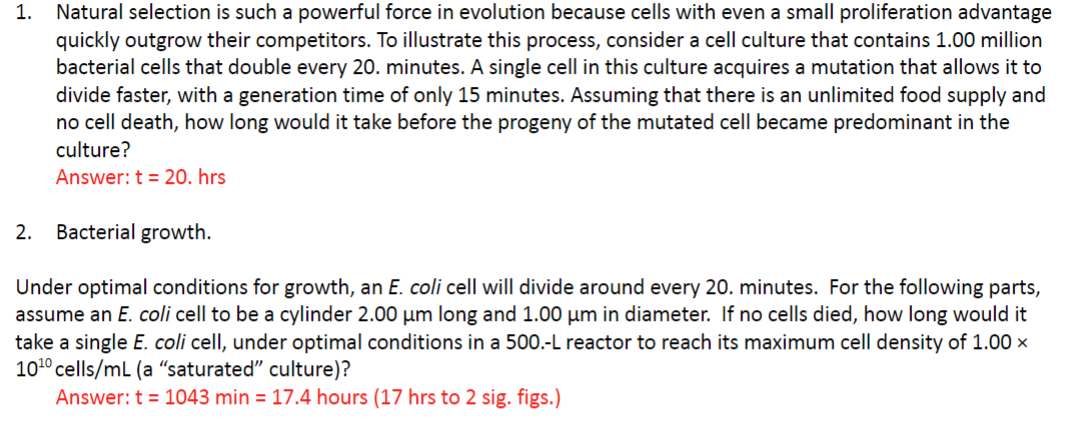1. Natural selection is such a powerful force in evolution because cells with even a small proliferation advantage quickly outgrow their competitors. To illustrate this process, consider a cell culture that contains 1.00 million bacterial cells that double every 20. minutes. A single cell in this culture acquires a mutation that allows it to divide faster, with a generation time of only 15 minutes. Assuming that there is an unlimited food supply and no cell death, how long would it take before the progeny of the mutated cell became predominant in the culture? Answer: t = 20. hrs
1. Natural selection is such a powerful force in evolution because cells with even a small proliferation advantage quickly outgrow their competitors. To illustrate this process, consider a cell culture that contains 1.00 million bacterial cells that double every 20. minutes. A single cell in this culture acquires a mutation that allows it to divide faster, with a generation time of only 15 minutes. Assuming that there is an unlimited food supply and no cell death, how long would it take before the progeny of the mutated cell became predominant in the culture? Answer: t = 20. hrs
Biology 2e
2nd Edition
ISBN:9781947172517
Author:Matthew Douglas, Jung Choi, Mary Ann Clark
Publisher:Matthew Douglas, Jung Choi, Mary Ann Clark
Chapter19: The Evolution Of Populations
Section: Chapter Questions
Problem 4RQ: What is the difference between micro- and macroevolution? Microevolution describes the evolution of...
Related questions
Question
please help explain how to get to the answer

Transcribed Image Text:1. Natural selection is such a powerful force in evolution because cells with even a small proliferation advantage
quickly outgrow their competitors. To illustrate this process, consider a cell culture that contains 1.00 million
bacterial cells that double every 20. minutes. A single cell in this culture acquires a mutation that allows it to
divide faster, with a generation time of only 15 minutes. Assuming that there is an unlimited food supply and
no cell death, how long would it take before the progeny of the mutated cell became predominant in the
culture?
Answer: t = 20. hrs
2. Bacterial growth.
Under optimal conditions for growth, an E. coli cell will divide around every 20. minutes. For the following parts,
assume an E. coli cell to be a cylinder 2.00 um long and 1.00 μm in diameter. If no cells died, how long would it
take a single E. coli cell, under optimal conditions in a 500.-L reactor to reach its maximum cell density of 1.00 x
10¹0 cells/mL (a "saturated" culture)?
Answer: t = 1043 min = 17.4 hours (17 hrs to 2 sig. figs.)
Expert Solution
This question has been solved!
Explore an expertly crafted, step-by-step solution for a thorough understanding of key concepts.
This is a popular solution!
Trending now
This is a popular solution!
Step by step
Solved in 4 steps with 17 images

Knowledge Booster
Learn more about
Need a deep-dive on the concept behind this application? Look no further. Learn more about this topic, biology and related others by exploring similar questions and additional content below.Recommended textbooks for you

Biology 2e
Biology
ISBN:
9781947172517
Author:
Matthew Douglas, Jung Choi, Mary Ann Clark
Publisher:
OpenStax

Biology: The Dynamic Science (MindTap Course List)
Biology
ISBN:
9781305389892
Author:
Peter J. Russell, Paul E. Hertz, Beverly McMillan
Publisher:
Cengage Learning

Biology (MindTap Course List)
Biology
ISBN:
9781337392938
Author:
Eldra Solomon, Charles Martin, Diana W. Martin, Linda R. Berg
Publisher:
Cengage Learning

Biology 2e
Biology
ISBN:
9781947172517
Author:
Matthew Douglas, Jung Choi, Mary Ann Clark
Publisher:
OpenStax

Biology: The Dynamic Science (MindTap Course List)
Biology
ISBN:
9781305389892
Author:
Peter J. Russell, Paul E. Hertz, Beverly McMillan
Publisher:
Cengage Learning

Biology (MindTap Course List)
Biology
ISBN:
9781337392938
Author:
Eldra Solomon, Charles Martin, Diana W. Martin, Linda R. Berg
Publisher:
Cengage Learning

Biology: The Unity and Diversity of Life (MindTap…
Biology
ISBN:
9781337408332
Author:
Cecie Starr, Ralph Taggart, Christine Evers, Lisa Starr
Publisher:
Cengage Learning

Biology: The Unity and Diversity of Life (MindTap…
Biology
ISBN:
9781305073951
Author:
Cecie Starr, Ralph Taggart, Christine Evers, Lisa Starr
Publisher:
Cengage Learning